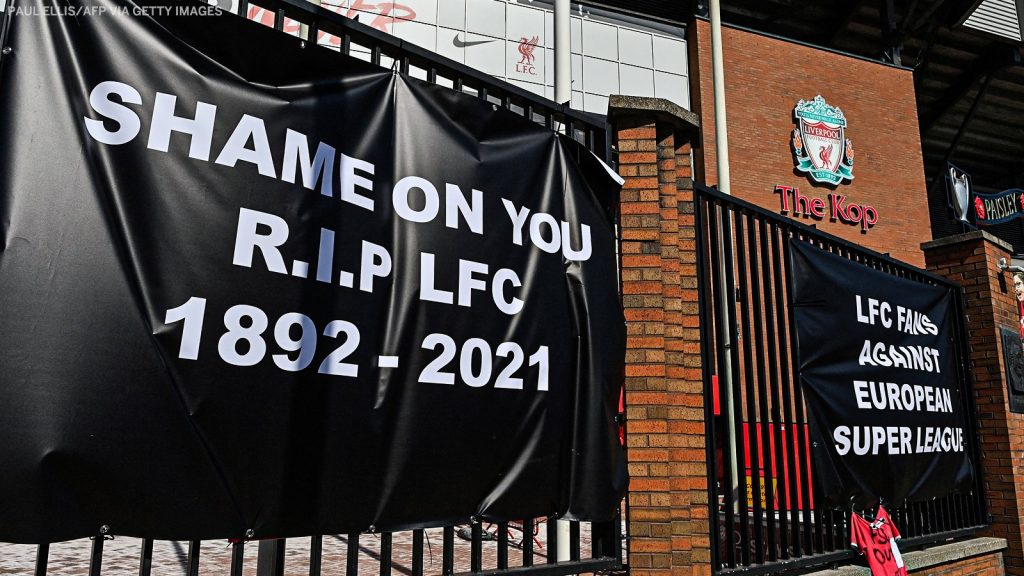Just like a bombshell, football fans around the world were hit on Sunday evening with news about the breakaway of 12 European clubs who have together formed a European Super League (ESL). These clubs, comprising some of the biggest clubs in European and world football, have relinquished the membership of their national as well as continental football associations to run solo.
From the EPL, Manchester United, Liverpool and Chelsea, all of whom have enjoyed European successes, are joined by Arsenal, Manchester City and Tottenham, all of whom have not. This kind of imbalance would form one of the bases for opponents of this breakaway football body to attack from. How is it a European Super League when there are fewer clubs that have enjoyed success on the continent in it than outside?
Thus, while a statement issued by the European Super League itself claims the founding members will be looking to “deliver the best outcome for football as a whole”, opponents like Garry Neville believe the members are only looking to deliver the best financial outcome for themselves alone.
The Money Game
Many football pundits, analysts and fan groups have condemned the breakaway football body, insisting that their action was spurred by greed and money-grabbing and not for the integrity of the game. According to them, it is more of a financial move than a sporting one.
This claim is more pronounced considering that nearly half of the 12 clubs that have declared for the football mega competition are in financial trouble, with a club like Barcelona more than $1 billion in debt. With each club set to get a share of $4.2 billion to begin with (between $250-300 million), it’s not hard to see how much financial relief the clubs in trouble will find.
American banking giant, JP Morgan would be financing the European Super League with nearly $5 billion at an interest rate of 3%.
“The men who run these clubs are only interested in making money, this is what it is about, they do not know their history, they do not know the history of English football, they don’t know the history of European football,” Sky Sport’s Kaveh Solhekol said of the breakaway body.


His stance has since been supported by football bigshots the world over as well as numerous fan groups. Liverpool fans went ahead to place banners condemning the new league while threatening to pull down every flag and other club paraphernalia
Broadcasting rights and why Nigerians should be worried
Because money does answereth all things, the answers a lot of people seek might just be that. Money. While JP Morgan’s $5 billion ‘investment’ is a lot, we have seen that most of it would be gulped down immediately with clubs sharing a $4.2 billion bounty to start with. This means they get between $320 to 400 million each, more than about $120 million clubs get for winning the Uefa Champions League (UCL).
There’s also going to be a windfall from broadcasting rights to the tune of about $300 million. But where would all the money to pay back JP Morgan and ensure the survival of the European Super League come from? Yeah, broadcast rights.
According to reports on Marca, the founders of the Super League expect to draw in a mind-boggling 10 billion euros. This is way and outrageously above the paltry 4 million euros Uefa reportedly made from broadcast rights in 2020 according to Marca. This invariably means broadcasters like Sky Sports, ESPN, Super Sports etc might have to pay more…a whole lot more, to obtain European Super League rights. Invariably, viewers would be slammed with huge subscription fees.


Another option the league founders might explore is the pay per view (ppv) option. Indeed the body noted in its statement that the Covid-19 pandemic has presented economic challenges which the current football model couldn’t cope with and thus required a new ‘commercial approach’.
The formation of the Super League comes at a time when the global pandemic has accelerated the instability in the existing European football economic model. The pandemic has shown that a strategic vision and a sustainable commercial approach are required to enhance value and support for the benefit of the entire European football pyramid.
European Super League Statement
The ppv option has largely been the prerogative of combat sports so a quick peek at how it works out for them might be in order. In a sport like boxing, premium fights make an average of between $150 million to $200 million on pay per view. The average boxing ppv is roughly $50 (about N20,000) which the average Nigerian can’t pay even to subscribe for a month.
These ppv events won’t be broadcast on your regular PayTV platform unless of course they subscribed specially for them. For a sport like the Ultimate Fighting Championship (UFC), a platform like SuperSports pays a premium for their content. And on SuperSport, only the DStv Premium (N16,200) and DStv Compact Plus packages (N10,925) show them.
The European Super League definitely places more premium on its content than the UFC. And with a $10 billion target on broadcast rights alone, you could expect the body to charge PayTV operators a whole lot more than any other sports event.
UFC makes more than $500 million from broadcast rights and ppv a year. The NBA makes more than $3 billion from broadcast rights in a year.
Thus, football fans and lovers in Nigeria might have to be subjected to outrageous fees to view Super League matches. With most viewing centres subscribing to the Compact Plus package for access to both Premier League and UCL matches, the cost of this package might soar if the founding clubs insist on hitting their projected revenue.






